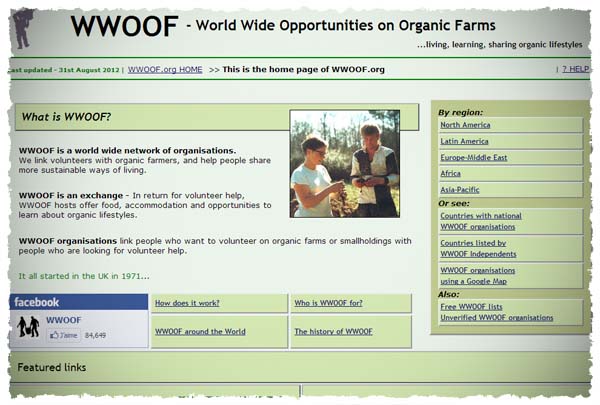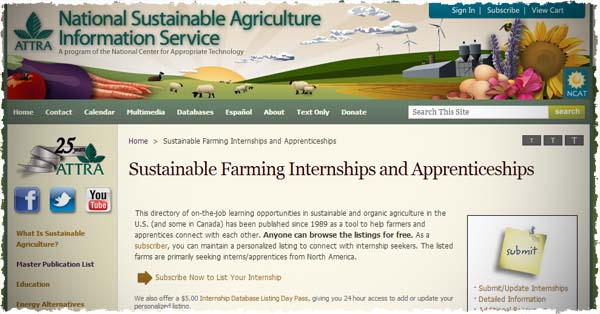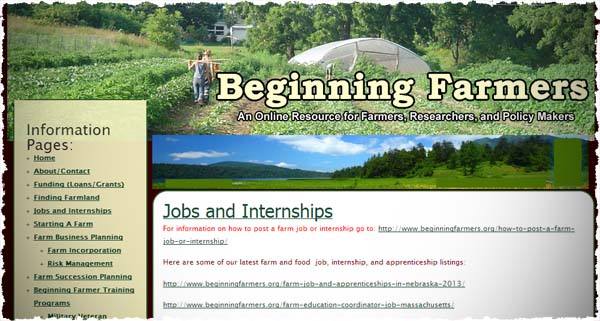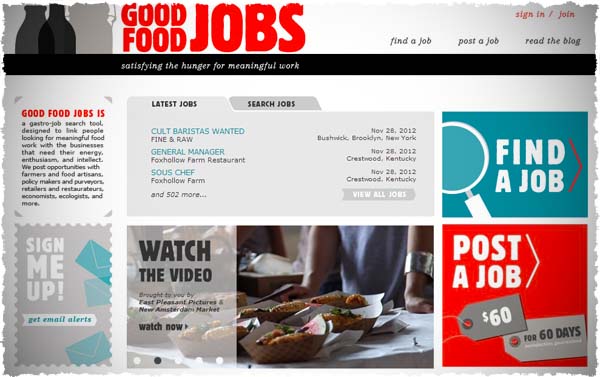How To Find An Internship or Apprenticeship On An Organic Farm
/Now that you have WWOOFed on one farm, two farms, a few farms, and you are ready to take the leap and become a farm apprentice, let's take a look and see where and what you need to start that process.
Why Become an Organic Farm Apprentice?
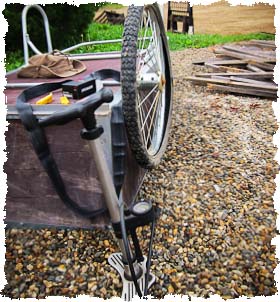 Farming is a trade just like plumbing, carpentry, or electrical. Just like any trade there is trade school, apprenticeship requirements, and a steep learning curve. Your farm apprenticeship is the next step to either realizing your dream of becoming a farmer, or realizing that this may not be for you.
Farming is a trade just like plumbing, carpentry, or electrical. Just like any trade there is trade school, apprenticeship requirements, and a steep learning curve. Your farm apprenticeship is the next step to either realizing your dream of becoming a farmer, or realizing that this may not be for you.
Unlike most trades, you have to know just about every trade to make a halfway decent farmer. Even being a bike mechanic can come into play while working on a farm. Our Vermont Cart which is used to haul things around the farm got a flat tire. Since I have changed dozens of bike tires in the last year riding across the country, it was my job to fix the wheel.
Whether you are looking to start your own farm, or you are looking to be a hired hand at an existing farm, you need experience in the field. A farm internship will give that to you. You are building a new resume, and this is a good place to start.
Depending on your dedication to looking, your luck at finding a place, and the opportunities available, you do not have to lose money learning how to farm. Some farms offer housing, others housing and food, and still others (though fewer) offer housing, food, and a stipend. Stipends can range from $50 a week to around $200 a week. You're not going to buy a Mercedes, but when you consider that you have no rent to pay, and most of your food bills are covered, it's a pretty good gig. Besides, you're there to learn, not to make money. Knowledge is wealth.
Where to Find Organic Farm Internships / Apprenticeships
There are a lot of places and ways to find internships. Some lay it right out there for you, some you will have to dig for. To find the one you want, it is definitely worth being persistent. You are going to probably spend most of a year working very closely with a stereotypically eccentric group of people. You want to make sure you mesh with the farm, the surroundings, and the people.
The first place I would start is with your local farms and the people that you know. If there is a farm that you love to buy from at the farmers' market or you are subscribed to their CSA, do not be afraid to ask if they have volunteer or internship opportunities. What's the worst they can say? No? Then you move on and find somewhere else. Finding a place close to home means you can stay local and you might not have to sleep in a tent for the summer as "intern housing".
The second place to start is Google. Do a Google search for "farm internship" or "farm apprenticeship" and see what comes up. Add in the name of your state, or what you think you might want to grow.
WWOOF.org
WWOOF or WWOOFUSA is not a bad place to start looking. If you have done some volunteering on farms, you are already a memeber ($20 a year) and are familiar with the website. Some WWOOF farms prefer or even require a year long commitment. In general the WWOOF relationship between you and the farmer is that you are a volunteer. If you are looking to make at least a few bucks off your apprenticeship it might be tougher to find going this route. Though, it is not unheard of and you can find paid opportunities.
National Sustainable Agriculture Information Service (ATTRA)
I used the ATTRA website a fair amount while looking for my apprenticeship. A lot of the listings in here offer housing and a stipend. Not all of them do, but certainly more than the WWOOFing website. They are organized pretty well into regions and states. Figuring out what area of the country (or which country) you want to farm in before you go looking helps you narrow your search by a lot.
Spend some time reading the descriptions for each place. After a while, you will get good at skimming for the details you really want to find. When you find a farm, do a Google search on them. Find their website, find any news articles they may be in online. Believe me when I say that it is no good for anyone involved if you end up at a place where you are not happy.
BeginningFarmers.org
Certainly bookmark this page. As you merrily skip down that path toward becoming a family farmer, you will be visiting the Beginning Farmers website more than a handful of times. Their Jobs and Internships page is a seemingly disorganized organized amalgamation of links that will bring you to any number of websites with job listings. Not all the websites will be what you want, and some of them are terrible. But there are also a lot of great links there, and this page alone saves you hours of searching Google.
GoodFoodJobs.com
Just because you spend a season working on a farm does not necessarily mean you have to become a farmer. It's a tough row to hoe, believe me. I'm neck deep in it as I type this. If you work your season on the farm and decide it's not for you, there are a lot of other opportunities out there you can take advantage of to capitalize on your farm experience.
Jobs "in food" are becoming more popular, and more available. Good Food Jobs is a job posting board that will have listings for farm work, office work, and everything in between, all relating to "Good Food". You might find a farm job here, and you might find a job as a sales associate, or even a food services manager. My friend Chad was a chef in New York City, spent a year working on a vegetable farm, and now has started his own restaurant.
Besides, Taylor and Dorothy the co-founders of Good Food Jobs are fantastic people. They have done a lot of good work through their site and I would love to see it continue.
My Experience Applying for A Farm Apprenticeship
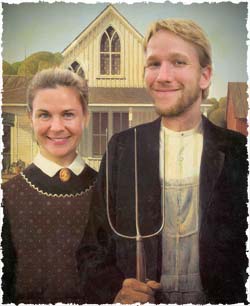 Nothing good comes easy, and I am proving that constantly. Finding not only the right farm, but a farm that would take a married couple was no small feat. While exciting and fun, it was also frustrating at times. I did not keep track of the hours that Kate and I spent looking, but we were determined to find the right farm.
Nothing good comes easy, and I am proving that constantly. Finding not only the right farm, but a farm that would take a married couple was no small feat. While exciting and fun, it was also frustrating at times. I did not keep track of the hours that Kate and I spent looking, but we were determined to find the right farm.
We used the above strategies and websites to track down farms to apply to. The ATTRA site was especially helpful. I think in total we applied to 18 farms. Some never returned our e-mails or calls and some out-right rejected us. Others told us that our timing was off and that they were either not to that part of their planning yet and not hiring, or they had just hired another young married couple from New York City and did not have any open positions.
At that time, I was market testing for Farm Marketing Solutions and I was exhibiting the company at various trade shows and slow food conferences around New England. It was at the CTNOFA conference in Connecticut that I finally found the farm I was looking for. One of the workshops was on using your website to market your farm. This is a specialty of mine and I was interested in what the presenters had to say, and more importantly what questions the audience had.
Erick & Patty Taylor of Devon Point Farm were hosting the workshop. Long story short, I knew after hearing them present that I knew I had to work at their farm. After the presentation, I went up and asked them if they had any openings for internships. Patty told me they did not take couples, but I could talk to Erick.
What ensued was the most elaborate hiring process I have ever experienced. Kate and I sent them resumes, cover letters, and photos. Over the next week, we talked on the phone a few times. They told us that they did not want to hire a couple, it was against their policy. (Hey, it's a volunteer position, they can make whatever rules they want). The reasoning, and I agree with it, is that if one person does not work out for whatever reason then they lose two people. That's two people they will have spent extensive hours training and would have to replace. I knew we wouldn't leave no matter what came our way so I was persistent.
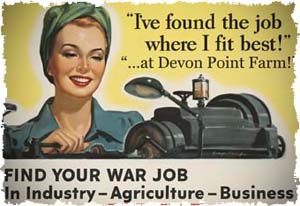 I wrote e-mails convincing them we were awesome. I even went so far as to Photoshop WWII propaganda. We had an in person interview which took half a day, after which they were still not sold on the idea of a married couple.
I wrote e-mails convincing them we were awesome. I even went so far as to Photoshop WWII propaganda. We had an in person interview which took half a day, after which they were still not sold on the idea of a married couple.
We Skyped, we talked with past interns, they talked with the interns that talked to us, and we talked via e-mail some more.
Finally, we wore them down. We got the apprenticeship, we had a place to stay, a beautiful farm to work on, knowledgeable farmers to work for, and a life changing experience.
Not everyone goes through that though. I have friends who just called the place, chatted for half an hour and they were hired. Simple as that. Not every case will be the same, far from it.
The moral of the story is, if you know what you want go for it!

